Movie By Movie: John Carpenter
The Star, The Shape and more from a genre legend...
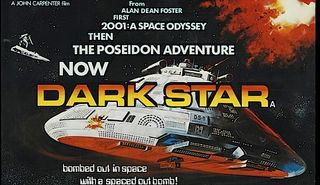
Dark Star (1974)
The Film: Originally inspired by Forbidden Planet that an eight-year-old Carpenter watched with jaw agape, Dark Star evolved from student films and the shorts that he'd made while trying to break into the movie business.
He and writer Dan O'Bannon scrounged $60,000 to make the story of slacker astronauts and their malevolently malfunctioning bomb.
And yes, he wrote the theme song's music, with lyrics aded by Bill Taylor.
Carpenter Chats: Made for what Carpenter accurately points out is "what it costs a major studio to sneeze," the film wasn't easy.
"We shot with barely adequate, poorly functioning equipment because we could afford nothing better. Our cameras would rattle and purr like cocktail shakers full of glass. The Coke bottles rammed on the front of the camera were posing as lenses. They wouldn't focus," he told Photon magazine in 1975.
Remade? Fortunately, the film's limited exposure means studios haven't touched it. Yet.
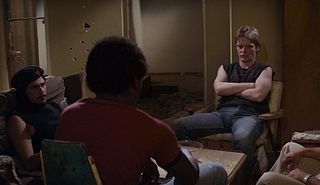
Assault On Precinct 13 (1976)
The Film: With Dark Star having failed to truly launch his career, Carpenter stuck to the indie route and, this time influenced by Howard Hawks' Rio Bravo, dreamt up the tale of a police precinct about to be closed that finds itself under attack from an LA gang.
It found success, particularly in London, and Carpenter was on his way. Well, sort of...
Carpenter Chats: “It may or may not be evident, but we got stung in a couple of places with the actors.
"Two factors governed the casting: the cast had to look right for the movie, but they also had to work for very little money, which meant that generally they came from the lowest rung of Hollywood actors.
"The guy who plays Napoleon Wilson was a friend of mine, and so he was in from the beginning. But there was one actor who could barely get his lines out. Every time he finished a speech, he would let out an audible sigh of relief. He has a minimal command of English, and can barely remember his lines, but he tries to play them like Othello.
His performance and one other only just squeak by. I cut the film myself, and I tried to edit out all the bad stuff."
Remade? Yes, in 2005 with Ethan Hawke and Laurence Fishburne in the lead roles and Jean-Francois Richet directing. It's surprisingly decent for a Carpenter re-tread.
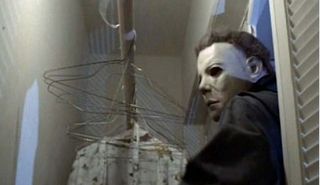
Halloween (1978)
The Film: And so we come to The Shape. Quite possibly the defining film of Carpenter's career, Halloween was born once he'd helped boost his career with script-for-hire jobs on the likes of The Eyes Of Laura Mars (though little of his work remains in that film's final cut).
Working from an idea spawned by producer Irwin Yablans, who thought a murderer stalking babysitters might be a killer concept, Carpenter welded that to Yablans' other suggestion to set it at Halloween. Michael Myers - and to a large extent, the slasher genre - was born.
Carpenter Chats: “I decided to make a film I would love to have seen as a kid, full of cheap tricks like a haunted house at a fair where you walk down the corridor and things jump out at you. All cheap tricks. But when you come out, you love it.
"I remember a William Castle film, The House On Haunted Hill, where a skeleton came out of a box next to the screen and it floated on a string out over the audience. Real cheap stuff, but I watched that and thought, 'Wow, isn't that the greatest stuff of all time!'
"So I thought I'd make a film like that. F**k everybody. I don't care if this is something I shouldn't be doing. I really like it."
Remade? You might be familiar with Mr Rob Zombie's canon-tweaking first film, released in 2007 and the follow-up, which arrived this year to little fanfare and less box office. A third is still in development, though not with Zombie attached.
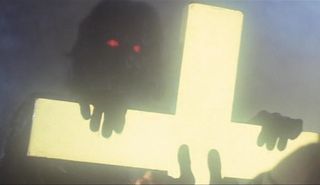
The Fog (1980)
The Film: A small US coastal town is overrun with malevolent spirits who drift in with a rising, spooksome mist.
It's a great example of stylish, atmospheric Carpenter work, even though it was shot on a shoestring by today's standards.
Carpenter Chats: "I came up with an idea before i connected it to a ghost genre - an idea of fog," he told Rolling Stone on the set.
"It's a frame in which to do certain cinematic things with ghosts. You don't really see ghosts as much as you think you see them. The fog moves around, it glows, it comes under doorways, through windowpanes, through your clothes…"
Remade? Our eyes! Our poor, abused eyes! The awful new version slithered on to screens in 2005 and was largely panned, then ignored by audiences. Thank goodness.
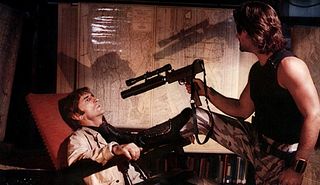
Escape From New York (1981)
The Film: Welcome to the grimy, futuristic world of Snake Plisskin (Kurt Russell), a hard-as-nails mercenary charged with rescuing the President when his plane crashes on the prison island of Manhattan.
It's a real ride of a movie with a grungy edge and plenty of crowd-pleasing bone-crunching moments. And it helped make Russell into something more than a Disney film star or an Elvis impersonator.
Carpenter Chats: Despite problems a little while before the shoot, New York's officials gave him permission for a location shoot that would be a dream these days.
"They read the script and apparently didn't find anything wrong - although they may regret it when they see it. But I hope not.
"It really isn't a slam, although it does portray New York City as having become a violently inhumane place.
"The city officials not only gave permission but were very helpful. We were the first film company in history allowed to shoot on Liberty Island, at the Statue of Liberty, at night. They let us have the whole island to ourselves.
"We were lucky. It wasn't easy to get that initial permission. They'd had a bombing three months earlier, and were worried about trouble. But we were good tenants. We were extremely careful, and cleaned up our messes afterward."
Remade? Not yet, though not for want of trying. A new film has been in development for ages, with Gerard Butler attached, but nothing has yet come of it.
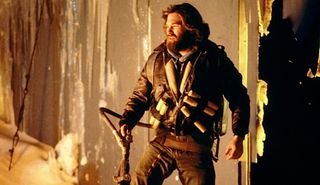
The Thing (1982)
The Film: After a brief, unsatisfying stop off helping to bring Halloween II to the screen (he directed additional scenes and clashed with main director Rick Rosenthal), Carpenter teamed back up with Russell for this remake of Howard Hawks' horror, itself adapted from John W Campbell's novelette Who Goes There?
Frozen terror is the order of the day as Carpenter makes a film that is - blasphemy! - superior to Hawks' and ratchets up the tension with some superb physical effects as scientists in the Antarctic are confronted with a shape-shifting alien.
Carpenter Chats: "I loved the first film. I thought it was great. But they left a lot of Campbell's story out of it. I read the story before I saw the film. I guess I was about ten. Even then, I realized that the whole nature of Campbell's Thing was different than that of Hawks'.
"Actually, Alien borrowed quite a bit from Campbell's concept of the creature. Now, I suppose, when this movie is released, it may be compared to Alien.
"I'm not worried about it, though. I mean, that was one of the few effective monster films to be made recently, and it only took snippets of Campbell's ideas. We have the entire story."
Remade? A prequel (if it remains that way) is at the scripting stage, with Matthijs van Heijningen Jr on board to direct. But it seems to be a real beast to figure out.
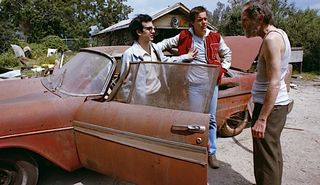
Christine (1983)
The Film: Carpenter and Stephen King would seem to be a match made in heaven (or maybe hell) but Carpenter has said that he mostly made it because that's all he was offered.
Still, the two were good friends and the tale of a nerd who buys and restores an odd, evil classic car still resonates, standing up as one of the better King-based films.
Carpenter Chats: "Christine wasn't a particularly scary movie; it wasn't supposed to be.
"The book is about a kid who's haunted by the ghost of this dead man. There's a rotting corpse in the back seat of this car.
If I wanted to scare you, I would have had the rotting corpse fall on the actor."
Remade? Like a possessed project, it has tried to worm its way back on screen in various forms, but so far nothing has made it out of development.
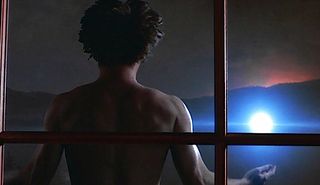
Starman (1984)
The Film: Veering away from the horrific to the fantastical, Carpenter switches gears smoothly for this affecting story of an alien (Jeff Bridges) who falls for an Earth woman (Karen Allen).
It's a wonderful movie, but didn't set the box office alight, though Bridges got an Oscar nomination for the role.
Carpenter Chats: "I wanted to make a fairy tale rather than a sci-fi film," Carpenter told the LA Herald Weekly in 1984.
"I think it's much closer to The Wizard Of Oz than to Close Encounters. Or you might say it's It Happened One Night. with a sci-fi premise.
"I wanted everything about him to be in the realm of magic," the director adds about Bridges' lead character. "So he heals, he brings people back from the dead."
Remade? No one has tried to make a new film yet, but there was a little seen TV version that lasted 13 episodes in 1986.
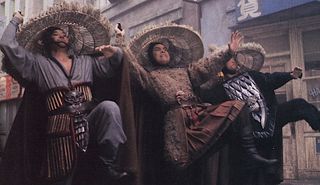
Big Trouble In Little China (1986)
The Film: Back in action (plus a large dollop of comedy) with Russell for a madcap adventure through magic and mystery.
Russell is all-American trucker Jack Burton, unwittingly dragged into a battle between kung fu warriors and evil spirits over the fate of two women. Can his sheer idiot arrogance help him survive?
The movie itself nearly didn't survive studio interference, and went largely unnoticed on release. It's since become a cult favourite.
Carpenter Chats: The experience of Big Trouble was the reason I stopped making movies for the Hollywood studios. I won’t work for them again," Carpenter said at the time.
"I think Big Trouble is a wonderful film, and I’m very proud of it. But the reception it received, and the reasons for that reception, were too much for me to deal with. I’m too old for that sort of bulls**t."
Remade? Not yet, although a video game was released in 1987 and a comic book series based on the film is on the way.
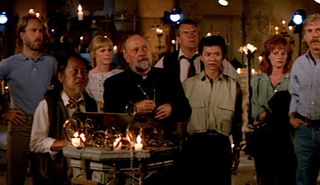
Prince Of Darkness (1987)
The Film: A return to low-budget chills for the studio-shy director. Considered by Carpenter as the second installment of what he called his Apocalypse Trilogy (with The Thing and In The Mouth Of Madness), it's probably best remembered for the mysterious, lava lamp-alike cylinder of swirling green evil.
Can the priest (Donald Pleasence) and the academics recruited to investigate it survive their time with the terrifying gloop?
Carpenter Chats: "I'm fascinated by religion in films. A lot of my movies have priests and are about religion.
"And I don't know what it is, but you know, horror stories have always worked on film. It's where they work. That's where vampires and ghosts and UFOs are real. They're not particularly real in life, but they're real on the screen.
"It's the communal aspect of movie-watching. Sitting in the dark. It goes back to sitting around a campfire when we had just come out of the trees."
Remade? No one has dared to touch it. Probably because Carpenter would unleash the Anti-Christ liquid on them.
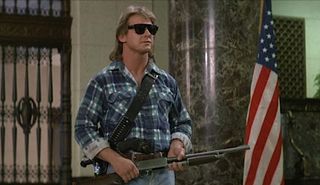
They Live (1988)
The Film: In These Credit Crunch times, They Live's central idea that capitalism is seriously dangerous for us seems more pertinent than ever.
Wrestler "Rowdy" Roddy Piper makes for a burly leading man who discovers that aliens have slowly, invisibly taken over the world and are treating humans like cattle, all thanks to the power of commercialism. It's pungent stuff, and still shocking/funny today.
Carpenter Chats: "I've become so disgusted by how far to the right this country has gone that I wanted to make a statement about it," he said when the film was released.
"I felt that They Live could be an Invasion Of The Body Snatchers for today; rather than Communists-under-the-beds, the monsters would be unrestrained capitalists.
"The Other, meaning the creatures, are yuppies, and I don't think they've been portrayed that way before; they've been shown as a kind of goofball part of us, but never as inhuman.
"In the US, the middle class is slowly disappearing: there are more poor people and more rich. I think They Live will be looked back on as one of the few voices of outrage at a time when everyone wanted two things: to win, and to make money; all other considerations were secondary."
Remade? A new take is on the cards for 2011, but we fear a big corporate studio retread would die from irony poisoning.
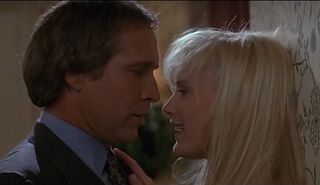
Memoirs Of An Invisible Man (1992)
The Film: Despite his claims to stay away from studios, Carpenter let Warners be involved in this mis-firing comedy that was supposed to be a fun vehicle for Chevy Chase.
It flopped, though Carpenter recalls that he had a good time making the thing despite effects challenges.
Carpenter Chats: "We’re telling the story of a guy who is turned invisible and the terrible things he goes through. Many of those terrible things are funny, but they are motivated by reality—or what we imagine reality would be in that situation. They’re not fabricated for the sake of a gag," Carpenter said during the making of the film.
"Chevy has a tremendous ability to bring irony to his character without going over the top.
"The plot hinges on Nick’s ability to think fast, to adapt and to be resourceful; Chevy develops Nick’s personality before the accident and after to make the story seem plausible and involving."
Remade? Er, no.
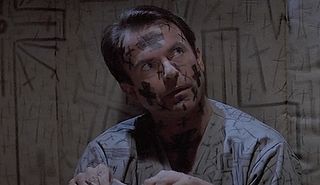
In The Mouth Of Madness (1994)
The Film: The third chunk of the Apocalypse Trilogy finds Sam Neil as an insurance investigator who discovers that a missing horror writer's work might be a little too real for anyone's tastes.
It's freakish and frightening, not to mention brain-twisting.
Carpenter Chats: "Our hero ends up in an insane asylum questioning his sanity," Carpenter says.
"That's the whole point of the picture, although it can also be looked at in a number of other ways. It's a horror adventure, about discovering this evil force that's taking over the world.
"But it can also be seen as a classic 'Am I crazy or not?' story. You have to kind of decide for yourself, when you see the film, if he's crazy. I don't think he is. I think it's all real."
Remade? Nothing as of yet.
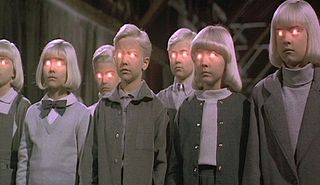
Village Of The Damned (1995)
The Film: A major misstep as Carpenter attempts another remake of a classic terror tale - in this case John Wyndham's The Midwich Cuckoos.
It's the start of a sad slide for the horror-meister who just couldn't seem to find the right tone for this.
Carpenter Chats: "When I was 12 years old I saw the original and it stuck in my mind for several reasons," he recalls.
"The whole idea of a whole town blacking out was ‘Wow!’ Also, I somehow got this incredible crush on one of the girls in the original. She was the first love object I had; I wanted her to zap me and take me over and make me do whatever she wanted.
"I also knew exactly where to shoot it. I live up there, Inverness, Calif., and Point Reyes, where we shot The Fog in 1979.
"It’s paradise; you can stand anywhere, put the camera down and shoot and you’ve got it, it’s there. It’s a small town, plus it’s home; I get to shoot at home for a change. So off we went."
Remade? No one has touched the tale since.
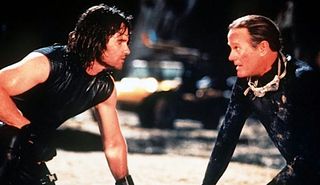
Escape From LA (1996)
The Film: Yes, it reunites Kurt Russell and John Carpenter, and brings Russell's beloved Snake Plisskin back to the screen. Sadly, it's awful.
In what feels like a unofficial remake, Snake is called in to infiltrate the island of Los Angeles to recover a doomsday device which the president's daughter has stolen. Yawn…
Carpenter Chats: "The weekend before we started principal photography, I was sitting around my house, brooding.
"My wife and my son said, 'What's wrong with you?' I said, 'I'm worried that I don't know the style.' The original Escape was written in 1974 and wasn't made until 1981. That was a young man's idea, it was a vision of somebody who saw things differently. Now, I'm an old veteran. Am I going to be able to get back in the saddle again?
"Well, with the first shot I realized, 'What am I worried about?' It's like riding a bicycle. Or for me, like flying a helicopter. You just start it up and there you go."
Remade? Everyone is more interested in New York, but if that remake ever takes off, who knows?
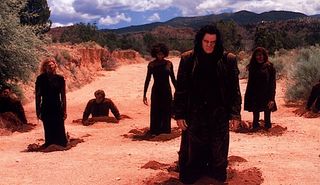
Vampires (1998)
The Film: More lightweight work that still has the feel of Carpenter revisiting his greatest hits to diminishing returns.
That said, it has an enjoyably OTT turn from James Woods and a fun tale of the fang club trying to find a Catholic relic that would let them hunt in the sun.
Carpenter Chats: "I was actually toying around with getting out of the business for a while and I couldn’t decide if I should. It stopped being fun," he says.
"Then along came Largo Entertainment. Vampires was basically an action, mercenary novel with vampires being the evil threat. Two screenplays were written – one by Don Jakoby, the other by Dan Mazur.
"So I took all the stuff home with me to read, and both screenplays were pretty good. The novel had something about it.
"I found all of this interesting so I took the two screenplays and the book and said, ‘I could do something with this.’
"I went in my office and thought, ‘It’s going to be set in the American Southwest and it’s a Western – and I wrote it. I combined the two screenplays together utilizing elements from this one and that one, a little bit of the book and a bunch of me, and out it came from there. It worked out pretty well."
Remade? A couple of direct-to-DVD sequels (one starring Jon Bon Jovi) are all that have come of it so far.
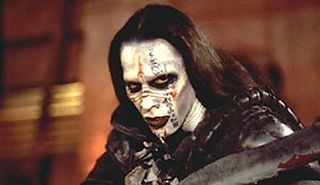
Ghosts Of Mars (2001)
The Film: Familiar Carpenter themes - the supernatural, a siege mentality and more come into play with this red planet-set action thriller.
Natasha Henstridge is a cop in pursuit of Ice Cube's con Desolation Williams across the forbidding territory. And that's not her only problem: spirits of ancient Martians are pissed off that human colonists are disturbing their rest, so they take it out on us pesky homo sapiens.
As for right now, he's finishing up work on asylum horror The Ward and trying to get prison thriller Riot off the ground.
Carpenter Chats: "It started back at Miramax. Bob Weinstein asked me, 'Why don't you do a Mars movie kind of deal?' But he didn't say, 'Mars movie,' he said, 'Why don't you do an movie in outer space with the supernatural?'
"I wrote a treatment and he said, 'I don't like this; it's like your old films and like your other movies.' So I said, 'All right.'
"We raised some money in France and I needed a screenplay, so I called Larry Sulkis and said, 'Look, let's dash something out.' So I had a little treatment. That's kind of how it got started."
Remade? Zero interest so far.
James White is a freelance journalist who has been covering film and TV for over two decades. In that time, James has written for a wide variety of publications including Total Film and SFX. He has also worked for BAFTA and on ODEON's in-cinema magazine.
Most Popular


